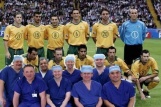I sometimes wonder if my use of analogy is counter-productive but as I was struggling to find comparisons and analogies to demonstrate the interaction and relation between Consultants and medical management I was drawn back to professional football and I think I’m onto a winner.
In hospital medicine doctors work in small teams under the supervision of a Consultant. Ultimately, most Consultants work as independent practitioners within the hospital. True they may be part of a Diabetic team or Upper GI surgery or the Acute Mental Health team but one of the goals and privileges of being a Consultant is that we work at the pinnacle of our profession attempting to deliver care to the best of our personal knowledge and ability.
Within hospitals these Consultants work as part of larger teams and that team delivers care for a particular problem; such as Diabetes or a geographical area such as central Nottingham or even for a specific age group such as newborn children. Ultimately there is a umbrella covering this whole varied group and this may be a Hospital or a Trust or a regional service ultimately managed by someone such as a Medical Director. The exact inticacies of this are not important but what you do have is highly specialised individuals working with others in a larger group directed towards one over-riding purpose for that uinified group. A Premiership football team.
Each “player” or Consultant is highly trained, highly specialised and often brought into the team at that level of maturity. They offer experience and knowledge that may be of international reknown in one specific area and whilst they can be developed that is only within this ability channel not generically. No more can you encourage the goalkeeper to take over as a winger than get a Vascular Surgeon to do some hip surgery even althoughugh in a previous junior “team” he may have taken on that role.

Clearly for the whole team to succeed there is a requirement for effective teamwork, communication and sharing of the ball. Some of the roles have glamour attached as media celebrities performing Heart transplant surgeons up front receive the plaudits of the red-top press but there is no doubt that without the midfield solidity of General Medicine and the decisive tackling of the Casualty specialist at centre back that the team would fail overall.
Extending the metaphor towards breaking point it is clear that some teams play with no sense of common purpose. Glory seeking wingers rushing for the goal only leave gaps at the back that the goal hangers of negligence sweep past. Old fashioned tactics of brutal tackling and the high ball attract poor crowds and the finances dwindle away. Not every team performs on the day despite the ministrations of the manager as they just fail to gel and even an occasional sending off may actually bring out the best in a team as they draw together defensively.
Clearly, whilst the manager gives instructions and plans before the game, “when they cross the white line” every player is their own boss whether they hang back and make a mockery of the rush offside defence or leave the lone striker up front with no ball because of selfish showboating in the midfield it is all about effective leadership and communication.
I’m going to leave it there, John, give all credit to the boys, who held their hands up and played for the badge. It’s a marathon, not a sprint and if we keep our noses to the grindstone we can save ourselves from the drop. Myself and the lads’ll be back, you know, you know wif more analogies cos, you know, if we give 110% we can turn this around, regain the dressing room and, you know, do it for the supporters. all credit to them.
What do you think John? Did the lads done good? Is that an apt analogy or just another cliché?
I think the analogy is true.
Leave a comment